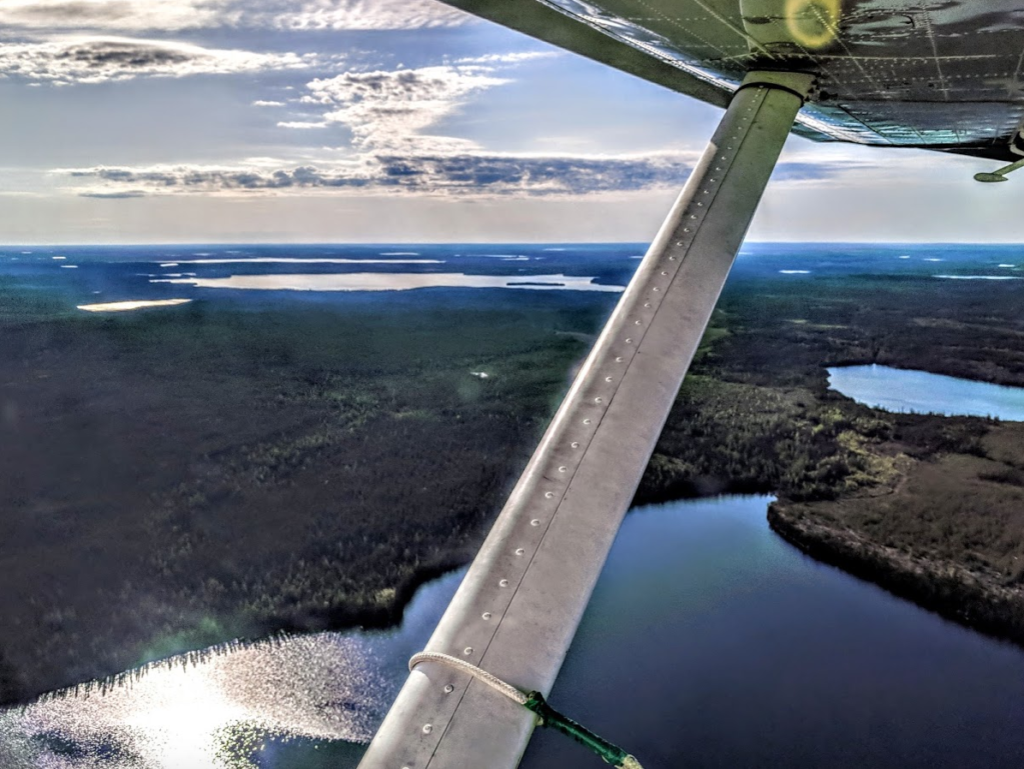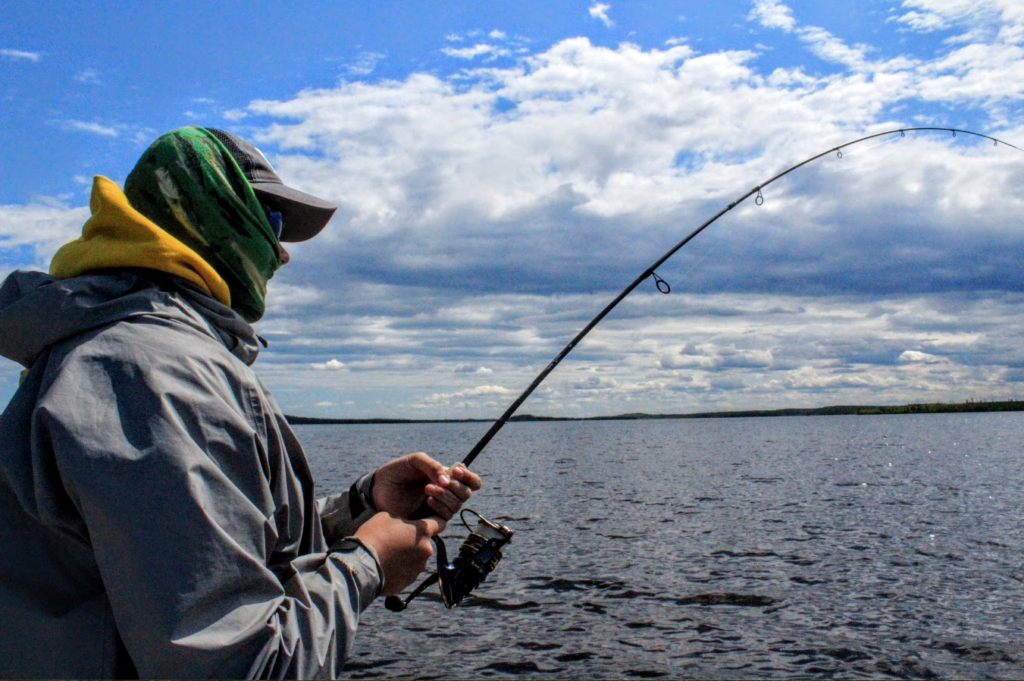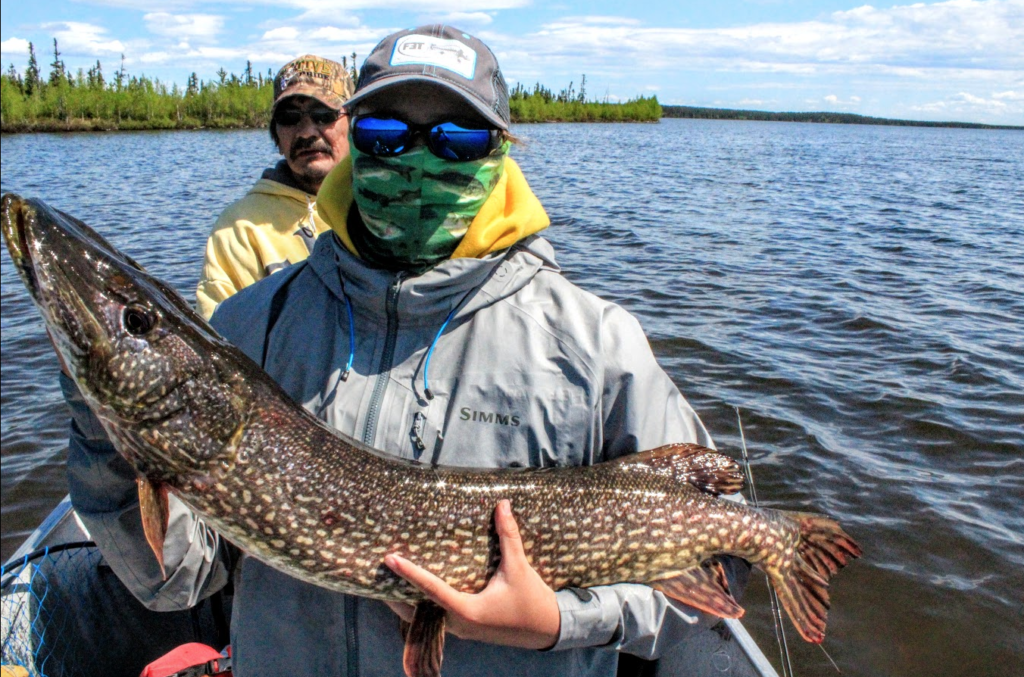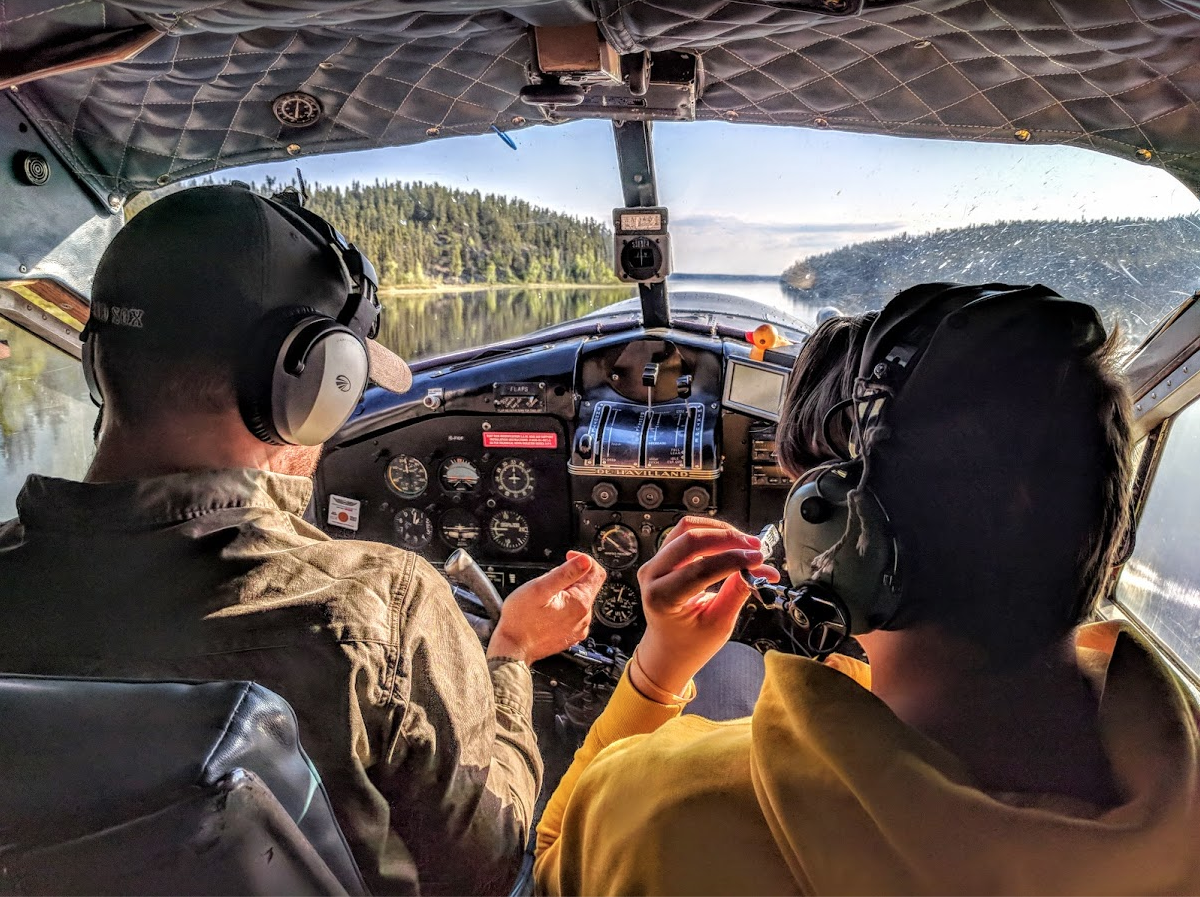Cameron donned the headphones in the co-pilot’s seat, the splendor of McGavock Lake spread out before him through the windows of the DeHavilland Beaver.
He had a little spring in his step that morning as he jog-walked his way down to the dock where the Beaver floated on the calm boreal lake that, for most of the previous six days, sported angry gray water, white caps and that menacing spray that slices through boat-bound anglers as they hustle back to the lodge after having declared that “enough is enough.”
When the pilot pointed to the passenger seat up front, Cameron clamored into the aircraft with an ear-to-ear grin on his face, about to take this second float-plane ride, this one from the best seat in the house. This was “fly out day,” where he’d fish a remote lake about a 20-minute flight from Laurie River Lodge, our home base for eight days while we fished for pike and walleye along the Canadian Shield in far northern Manitoba.
“Are you ready, Cameron?” Henry asked in his accented Englished, laced perfectly with his native Cree and that patented Canadian emphasis on the vowels. Cameron nodded, the smile still stretched across his face.
Watch your fingers
“Do me a favor?” Henry asked. Cameron nodded again. Henry squeezed my son’s shoulder and looked the boy in the eyes. His expression sobered.
“When we get to Kudeniuk,” he said, “don’t put your fingers in the lake. I don’t even wash my hands in it.”
Henry’s expression never broke. Cameron started to laugh, assuming the guide was pulling his chain. But Henry slowly shook his head.
I slid into the back seat behind my son. Our guide, Henry, a member of the Cree First Nation, hopped in next to me. He reached up and tapped Cameron on the shoulder. My son turned around and lifted the headphones off of his ears.
“They come out of nowhere,” Henry said. “One minute, there’s nothing. The next, they’re grabbing your hand. I’m not kidding.”
Cameron looked back at me, the grin fading from his face. I looked back at him and shrugged. It reminded of that scene in Bull Durham, after Crash Davis and Nuke Laloosh conspire to bean the mascot.
“I don’t know where it’s gonna go,” Crash tells the batter after Nuke delivers a pitch to the bull’s head. “I swear to God.”
Cameron turned around, plopped the headphones back on his ears and stared out at the lake.
For the first time all week, the sun overhead was beating back the clouds. It was warm, and after five mornings spent tucked in his rain gear, shivering as the boat pushed us into pike country, he was comfortable.
“They come out of nowhere,” Henry said. “One minute, there’s nothing. The next, they’re grabbing your hand. I’m not kidding.”
Henry nudged me and winked. Then he sat back in the seat, strapped his seat belt tight and closed his eyes. Moments later, the rotary engine of the plane rapped to life, and the pilot had us out in the lake’s main channel, nose pointed into the soft sub-Arctic breeze.
Headphones drowned out most of the sound that accompanied the plane’s engine—a comfortable repeating report all too familiar to anyone who’s fished remotely in the north, from Maine to the Alaskan Arctic. The vibrations rattle your bones and tickle that sense of adventure that every backcountry angler possesses. You know that in just a bit, you’re going to be somewhere special. Somewhere few others will ever visit, let alone cast a fly.
Or wash their hands.
Taking flight
We glided over the North Woods in utter comfort—a float-plane ride is, if you can properly translate the constant throb of the engine into some sort of hypnotizing white noise, a peaceful experience. It provides time to reflect on where the fates have dropped you at this very moment on this very day. A look out the window is generally all it takes to convince you that here and now, you’re in the most amazing place on the planet, and you’re about chase fish that really, really like to eat.
And for Cameron, a child of the digital age, who moves with ease among phones, tablets, gaming consoles and computer screens, this was no digital recreation stretched out before him. As far as his 16-year-old eyes could see, the forests of the north were dented only by watery potholes—some just tiny green patches, and others, miles-long lakes. And below the surface in each one, adventure awaited. No roads. No power lines. No nothing. Trees. Water. And fish.

His head moved along the Beaver’s cloudy windows, neck craning in search of bears and moose among the timber. He looked back at me a few times, pointing below us at whatever he’d seen that I’d surely missed.
“There’s Kudeniuk,” the pilot announced through the headphones. Henry’s eyes opened, the catnap over. He nudged Cameron’s shoulder. The boy looked back over his left shoulder at the guide, and Henry just wiggled his fingers in front of his face, slowly shaking his head.
Rather than laugh, Cameron nodded. Arms and legs inside the ride at all times. He turned around and watched as we glided in and came to an easy rest on the lake.
Kudeniuk
Over the last few days as we battled rain and sleet and make-your-face raw Arctic wind on McGavock Lake, Kudeniuk had taken on a mythical stature. Others at the lodge—repeat visitors, most of them—spoke reverently about this remote boreal pothole carved out of the black spruce forest.
“If you’re going to fly out,” one of the guests said over dinner one night at the main lodge, “fly out to Kudeniuk.”
Other guests agreed. The biggest pike in Manitoba, they all said. Somewhere, in the cloudy, green water of Kudeniuk, a pike that stretches the tape more than 50 inches swims. It’s a monster that, out of sheer necessity, has turned to cannibalism to survive, for only other big pike can slake the hunger of a creature that big.
Over after-dinner cocktails one evening, the lodge’s photo album got passed around. It was heavy on big grins and big pike—dozens upon dozens of the photos featuring beasts well in excess of 40 inches simply bore a one-word label.
“Kudeniuk.”
And there we were. We stepped out of the Beaver onto a makeshift dock that looked as if it had seen one or two winters too many. It’s wooden slats were bleached gray and soaked through with tannic lake water. I looked into the lake through polarized lenses and not 10 feet off the dock, a sizeable pike basked in the morning sun, completely unphased by the racket created by Henry as he emptied the plane of necessities like coolers holding lunch, life vests and the like. I nudged Cameron and pointed.
Through his sunglasses, he, too, saw the fish. He slowly—and likely unconsciously—put his hands into the pockets of his bright yellow sweatshirt.
The lake looks a lot like any other North Woods lake. It’s not particularly massive—Henry said we’d see most of it on this day. He, of course, was loving the sunshine, too. After guiding us through squall after miserable squall, he, like us, was looking forward to finding fish in shallower water, taking in the sun after being forced deep during the recent reminder that winter still had a bit left in it.
“It’s going to be a good day,” he said, dragging one of the skiffs the lodge stores atop some logs on the lake’s edge into the water. Motor in place, coolers loaded, Henry motioned for us to get aboard. Meanwhile, the pilot had the plane back out on the lake, motor gunning again. As Henry pushed us out into a shallow finger bay of Kudeniuk, the plane lifted off the water and tipped its wing at us before disappearing over the spruce and birch trees lining the water.
We were alone on Kudeniuk.
Spinning
A day or two earlier, after Cameron grew frustrated at trying cast a heavy 8-weight into the wind, he’d switched over to a spinning rod. Predictably, his catch ratio had improved greatly as he was able to cover more water with the spoon or the plug he was pulling in behind a foot of wire leader.

Stubbornly—and also because I honestly wasn’t sure I could adequately use the bail on one of spinning reels without causing a classic McManus backlash—I stuck to my fly gear, even in the biting cold wind. I caught plenty of fish, and some nice pike on poppers over a burgeoning weedbed, but the switch changed Cameron’s perspective. One morning when the sun managed to push through the clouds, he and I boated over 100 walleye just by jigging near the bottom. It was immediate gratification for a kid who was clearly Jonesing for a little non-stop action and I’ll admit, it was fun to report back to the lodge that we’d just slayed them on that particular morning.
But, there, on Kudeniuk, under Arctic blue skies, we weren’t after walleyes. And, honestly, we weren’t after immediate gratification. Even Cameron understood that. As Henry motored us out into the lake, Cameron sat quietly in the front of the little skiff, a 6-inch silver spoon dangling from the tip of a stout casting rod. He was tense, like a drawn bow.
“I’ll tell you when,” Henry said. “Not yet. We’re not there, yet.
The little skiff pushed through the glass-smooth water, churning up last year’s decaying plant matter in its wash.
“In another month, we won’t be able to get in here,” Henry said. “It’ll just be weeds. But right now, the pike should be coming in here.”
Both Cameron and I felt Henry take a bit off the motor and the boat slowed to a crawl.
“OK,” Henry said. “Here. Cast here.”
The words were barely out of Henry’s mouth when Cameron uncorked a long cast with this spinning rod. The hunk of shiny steel hit the water, and my son started cranking.
“Faster,” Henry said. “It’s shallow here.”
Cameron upped the speed on his retrieve, and I could see the spoon flashing and dancing in the early June sunlight.
“Faster,” Henry said casually. Cameron did as he was told.
A wake appeared behind the spoon, pushing water. Cameron saw it and slowed the retrieve.
“No!” Henry shouted from the stern. “Faster!”
Cameron cranked the reel and the wake got closer and closer. Sensing the strike that was to come, Cameron reeled even faster. The spoon, now only a few feet from the boat rose in the water column, and the big, green ghost chasing the lure seemed to sense that this opportunity at breakfast was about to escape.
With a final push, the pike opened it’s white maw and inhaled the lure. From the front of the boat, Cameron set the hook.
The trophy
All hell broke loose. A tail the size of a boat paddle swept across the water at the skiff’s edge, dowsing Cameron with cold lake water, and the spinning reel, on loan from the lodge, started screaming. The pike, well over 40 inches long, pulled line from the reel with little effort, and Henry had to coach Cameron on the drag (this is where the McManus backlash would have happened to me, I’m sure), but after a couple of runs and a series of violent head shakes, the big fish finally came to Henry’s net.
Cameron rested the rod in one hand and shook the feeling back into the fingers of his other hand. He switched hands and repeated the gesture. Then, as if he’d done this his whole life, he looked at Henry.
“How long is it?” he asked, knowing that, in Manitoba, a pike had to top 41 inches to be considered a trophy.

“Forty-two,” Henry said, eyeballing the fish in the net. Moments later, the net, which featured a stretch of fabric adorned with a measuring tape along its bottom, confirmed it. Forty-two on the nose.
Henry leaned over the side of the skiff and inserted the jaw spreader into the big pike’s mouth. It popped open, revealing teeth that not only lined its lips, but also teeth that adorned the roof of its mouth and stretched back into its throat. Whatever finds itself unfortunate enough to get caught in those jaws very likely will never get out.
But, with some experienced maneuvering with a set of pliers, Henry got the hefty spoon out of the pike’s jaws and let the fish settle into the net.
“Do you want to hold it?” he asked Cameron. My son, perhaps a bit gun-shy after seeing a gaping mouth full of backward pointing teeth, looked at Henry and nodded.
Henry expertly and ging erly slid his fingers into along the big pike’s gills, careful not to get his fingers in the gills themselves (“They have teeth in their gills, too,” he noted), and gripped the fish carefully behind the pectoral fin. He lifted the pike from the lake and handed it to my son, coaching him on where to hold his hands. Cameron ended up cradling the fish and hiding behind his Buff and sunglasses, but got the hero shot of the boy with his fish, and Henry quickly put the beast back into the net, where he let it rest again.
“I think she’s ready,” the guide said, slipping the net under the fish. As if sensing freedom, the pike gave the guide a quick tail swipe, spraying him with water.
Henry started to reach into the lake to rinse the slime from his hands, but he paused. Then, he looked back at Cameron, sat up, and wiped his hands on his jacket. Cameron, fish slime coating his hands and arms, did the same thing.
“Sometimes I forget,” Henry said. “But not this time.”
Cameron grinned at the guide, wiping more pike slime from his hands on his jacket.
“Can I cast I again?”
Chris Hunt is the digital editorial director for TROUT Media. He lives and works in Idaho Falls. This story first appeared in Hatch Magazine.



